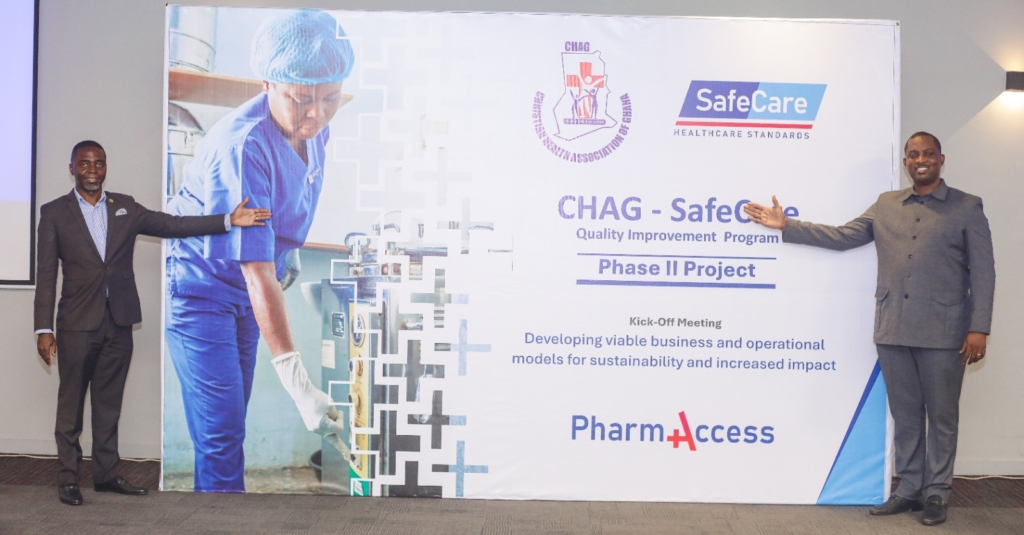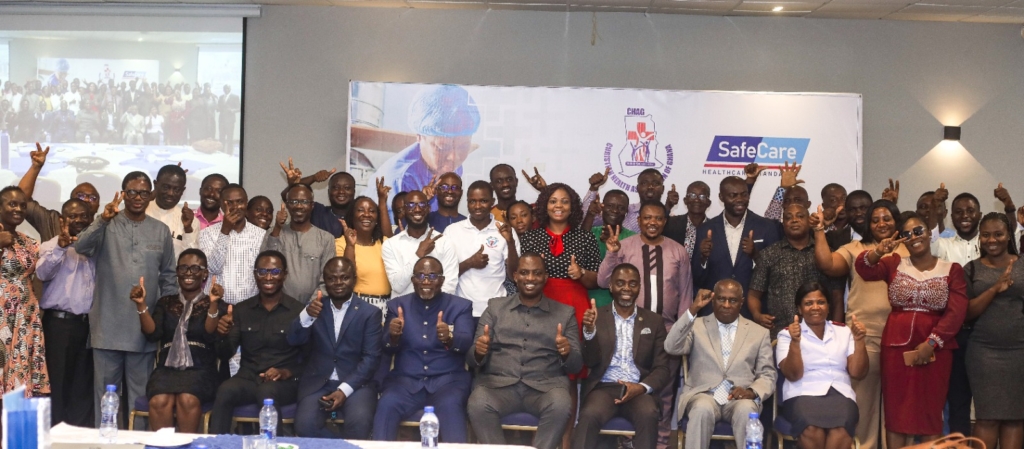The Christian Health Association of Ghana (CHAG) is calling for the institutionalisation and nationalisation of the SafeCare quality improvement programme in Ghana’s health delivery system.
Executive Director of the Christian Health Association of Ghana (CHAG), Dr Peter Yeboah, who made the call for the adoption of the SafeCare quality improvement methods, said the SafeCare methodology has been tested in all the CHAG facilities in Ghana and is an effective standard for measuring quality care.
Dr Yeboah emphasised the need for the scale-up of the QI program. “Before piloting SafeCare, quality health delivery was aspirational in CHAG, but now, there is a paradigm shift because SafeCare is an intentional, focused, and scientific way of measuring, rating, and benchmarking the state of quality of service and using effective interventions to improve the gaps identified,” he said.
According to him, quality care is an integral goal of every health policy and should be the foundation of health services. “Without quality, the unintended consequences of providing health services could be fatal.”
He emphasised that quality, through SafeCare, is a value proposition for the entire health sector where quality healthcare should be a centrepiece of all the efforts of healthcare providers towards the attainment of the Universal Health Coverage goals.

As Ghana pursues the United Nations' target of achieving Universal Health Coverage under the 2030 Sustainable Development Goals, stakeholders emphasize the significance of healthcare quality.
Dr Yeboah contends that, ultimately, tying NHIS claims to the quality of healthcare delivery by service providers will catalyze improvements in quality standards in hospitals across the country.
“We have to move SafeCare from organization to nationalization so that the entire country will benefit from this scientific way of measuring, rating, ranking, and benchmarking the quality of healthcare provisions in institutions."
"The value proposition that SafeCare provides is self-marketing, embracing all the efforts and commitment of key actors, policymakers, professionals, providers, patients, the public, and, most importantly, we are looking at how the payer, the National Health Insurance (NHIS), would also embrace SafeCare as an essential tool for assessing the quality of healthcare provided by the public to its insured members. SafeCare should ultimately become that value-based instrument for assessing the value aspect of reimbursed services; that is what CHAG is all about.”
Poor-quality care is responsible for an estimated 5 million deaths per year in LMICs—more than deaths due to insufficient access to care, which accounts for 3.6 million, according to the Lancet Global Health Commission.

However, the central role of quality is not yet sufficiently recognized and appreciated in the global discourse on universal health coverage (UHC). An important starting point is a better measurement of health system quality.
SafeCare is a unique standards-based approach for measuring and improving the quality of healthcare services in resource-restricted settings. PharmAccess Ghana, in collaboration with CHAG since 2019, has been using the SafeCare standards and quality Improvement methodology to strengthen healthcare systems in the CHAG network.
Under this collaboration, PharmAccess uses its SafeCare standards to assess, rate and benchmark the quality of all the network’s healthcare facilities.
Additionally, the program helps build capacity, enhances skills, and supports improvement in the quality of healthcare delivery at CHAG facilities nationwide.
Bonifacia Benefo Agyei, the Director for SafeCare Ghana, underscored the program's commitment to elevating the standards of healthcare delivery.
The SafeCare Director noted that SafeCare saves lives by improving health outcomes and reducing risks, and it also improves efficiency in the operations of healthcare facilities.
She added that some healthcare facilities' managers have adopted the SafeCare standards as a guide to run the operational systems of their hospitals and clinics. “It is time to make quality a culture in all health systems in Ghana."
Referring to the Lancet Commission’s article on mortality due to low-quality health systems, Bonifacia Benefo Agyei commented that “it means that you are even better off if you do not have access to healthcare than to have access but to poor quality of care. That is not acceptable; we think we should be able to change that narrative through the implementation of the SafeCare quality improvement programme.”
She said that, in this next phase of the programme, PharmAccess Ghana is working with CHAG to own the SafeCare quality programme and embed it in the CHAG system, for CHAG to run it by themselves without any donor support so that quality becomes a culture.
The SafeCare Director further hinted that SafeCare is in talks with the Ghana Health Service to begin embedding the SafeCare methods in the entire health delivery system in Ghana.
“The Ghana Health Service is also coming on board to make the SafeCare-supported quality improvement program a national initiative. We are looking forward to a future where quality becomes a culture and the norm in our healthcare system; we don’t have to beg for quality.” She added.
Dr. Maxwell Antwi, the Country Director for PharmAccess, said healthcare facilities should become safe nets for everyone who needs healthcare irrespective of who they are in society.
He explained that SafeCare does not only let health facilities know and acknowledge the gaps in their healthcare delivery systems, but it also provides guidance and standards to fix and improve the operations of the hospitals, clinics, and other facilities according to internationally certified standards.
“What we are doing with CHAG is driving equity and access to health, not only for the rich and famous but for the ordinary Ghanaian. “One of the lessons we have gathered is that quality improvements save more lives than access to care because more people live if they have quality care than if they don’t have the care at all,” Dr Antwi explained.
He said the Ghana Health Service has launched the Ghana Network of Practice through the leadership of the Director General, Dr Patrick Kuma–Aboagye.
Dr Antwi noted that SafeCare is to be the quality improvement programme for the network of practice.
With the Ghana Health Service gradually adopting SafeCare, there is a collective anticipation of a future where the pursuit of quality healthcare is not a plea but an inherent aspect of the nation's healthcare ethos.
The journey towards quality healthcare for all is an ongoing endeavour, and these collaborative efforts are instrumental in forging a path towards a healthier and more resilient nation.
Latest Stories
-
Livestream: Newsfile discusses mass sacking, Akwatia MP contempt & galamsey
13 minutes -
Chamber of Construction Industry pays courtesy Call on Roads Minister
3 hours -
IRS slashing thousands of jobs in heat of US tax season
10 hours -
Farmers say bird flu a ‘crisis’ as egg prices soar
10 hours -
Apple pulls data protection tool after UK government security row
11 hours -
MTN FA Cup: Gold Stars knocked out on penalties by Attram Devisser
11 hours -
Assemblyman alleges kidnap, torture on orders of NDC Bono East regional chairman
12 hours -
CAS dismisses Luis Rubiales’ appeal against FIFA’s three-year ban
12 hours -
When finding love on Facebook becomes a family tradition
12 hours -
We are committed to reviewing Cash Reserve Ratio for banks – BoG Governor
12 hours -
We can’t afford to lose our Indigenous languages – Atwima Nwabiagya North MP
13 hours -
Ghana Police Service refutes claims of neglecting injured officer at KATH
13 hours -
Cybervergent Ghana outlines key strategies for a secure digital future
13 hours -
Morocco struck late to beat Ghana’s Black Queens in friendly
13 hours -
Combine studies and certifications to boost your career prospects, CIB Ghana Chief tells students
13 hours

